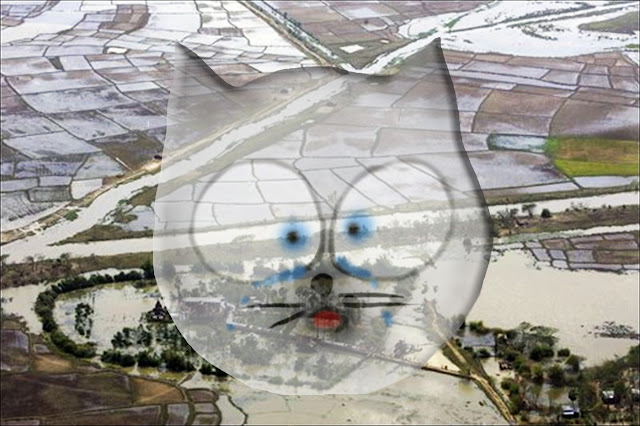NOMI: A TALE OF TOHOKU
NOMI
A TALE OF TŌHOKU
In
a village situated in the Tōhoku region of northern Japan, on a Friday, March
11th in the year 2011 to be exact, at about 2:46 pm, little
Nomi-chan* was playing on the swings in the town playground. Suddenly she got a
sickening feeling in her stomach as the swings, the ground, and everything
around her began to move in a strange way — first a shaking and then a swaying
motion she had never experienced before — a gigantic earthquake.
(*Nomi means flea or fleas)
Just
as soon as the shaking stopped, she headed straight for her home, just as fast
as her little legs would carry her. The
streets were eerie, quiet, almost deserted.
The
closer she got to her home, the more damage she saw — collapsed roofs,
storefronts, homes.
And
then she reached her own home only to find it had been destroyed. She climbed
into the wreckage and called for her mother, her father, and her brothers and
sisters — but there was only silence. Some people passed by in a car, filming
what they saw, but they did not stop to help.
“There
is no one there who can hear your calls or answer them,” said a voice behind
her. Nomi turned and saw kindly old Mr. Otaka, a neighbor from up the street.
Then a strange siren, one she had never head, started to blare frantically.
“Come
child,” said Mr. Otaka. We must hurry! The water is coming.”
Nomi
grabbed hold of his kimono and together they hurried as best they could toward
a nearby hill but it was slow going.
Then
another siren wailed, more frantically than the first. “Run Nomi,” said Mr.
Otaka, giving her a slight shove forward. “Run as fast as you can and don’t
look back. I’ll catch up to you.” Nomi ran as he told her, but she did look
back, only to see Mr. Otaka waving at her. She never saw him again.
As
she started up the hill Nomi heard a strange sound — a roaring sound — and as
she ran, she felt cold water begin to lap at her feet.
She
ran faster and just made it in time to the top of the hill and safety. Nomi
looked behind her. Everywhere she looked there was water and destruction.
North.
South.
East.
And
west.
Eventually
the water stopped it charge across the land. All was silent. And then the fires
came.
In
the morning, most of the water was gone and Nomi made her way back down the
hill and headed toward her home, but her way was blocked.
She
wondered through the town and then followed a group of people — tired, wet,
bewildered — as they moved south.
Everywhere
there was destruction no one could ever have imagined. People just stood or sat
crying.
As
Nomi walked she saw toys, just like her Teddy — her only friend it seemed —
lying in the wreckage. Her stomach felt queasy at the thought that the toys
were the playmates of children who would never play with them again. Just like
her, the toys were orphans — she knew this deep inside of her.
If
she were asked, Nomi could not say to this day how long she walked and where —
only southward and away. Eventually she came to another town where there was a
place to sleep; but it was crowded and there were not windows to keep out the
cold.
Several
days passed before food arrived and even then there were long lines of people,
patiently waiting for something to sustain them.
More
and more people arrived from the north each day. A nuclear reactor had exploded
and once again people had to run for their lives.
Sometimes
there was food and sometimes there wasn’t any. Sometimes there was a place to
sleep and sometimes there wasn’t any. Nomi met some other children who had lost
everything. They pledged to stay together.
Eventually
there was more food, but the lines were longer and there never seemed to be
enough.
There
were more places to sleep, but they were always crowded and cold.
Weeks
later temporary houses were constructed — tiny places, minimal places — but it
was a start.
Someone
was kind enough to see that Nomi and her friends had a shack to stay in.
I
tried to think of how to end this story but I couldn’t — for now there is no
end. Steps have been taken toward recovery, but still, many people live in tiny
shacks or are otherwise homeless. Food and medicine are not always plentiful.
People have lost their families, their homes, their livelihoods, or the means
to earn a living. Funding for the temporary homes is just that — temporary —
and that will end. Many politicians including Prime Minister Abe, despite their
words to the press, would like to see the problem just fade away, especially as
the plans for the Summer Olympics go on, spending billions of dollars on that
when so many people need so much and patiently ask for so little. And then
there is just greed and corruption.
EPILOGUE:
No, for now there is no end. Please think of these people. Please keep them in
your minds and hearts, and think of what you can do to help them - then do it.
The
characters Nomi (Nomi-chan), Bin, Bo, and Gami featured in this story are ©
Copyright 2014, 2015, and 2016 by Aoi Tokugawa, Hayato Tokugawa, Catman Comix™ and The Kitty
Mafia Art Worx™.
The
text of this story is © Copyright 2014, 2015, and 2016 by Aoi Tokugawa, Hayato Tokugawa, Catman
Comix™ and The Kitty Mafia Art Worx™. All rights reserved.




























seven years later . . .
ReplyDeleteand not much has changed . . .
.